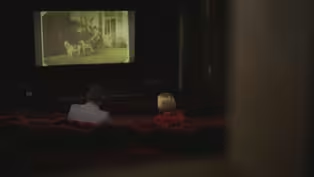
'The Mysterious Affair at Styles'
Clip: Episode 1 | 2m 55sVideo has Closed Captions
Lucy and Jamie discuss "The Mysterious Affair at Styles," and Poirot's unique qualities.
Lucy and Jamie Bernthal discuss "The Mysterious Affair at Styles," and Poirot's unique qualities.
Problems playing video? | Closed Captioning Feedback
Problems playing video? | Closed Captioning Feedback

'The Mysterious Affair at Styles'
Clip: Episode 1 | 2m 55sVideo has Closed Captions
Lucy and Jamie Bernthal discuss "The Mysterious Affair at Styles," and Poirot's unique qualities.
Problems playing video? | Closed Captioning Feedback
How to Watch Agatha Christie: Lucy Worsley on the Mystery Queen
Agatha Christie: Lucy Worsley on the Mystery Queen is available to stream on pbs.org and the free PBS App, available on iPhone, Apple TV, Android TV, Android smartphones, Amazon Fire TV, Amazon Fire Tablet, Roku, Samsung Smart TV, and Vizio.
Providing Support for PBS.org
Learn Moreabout PBS online sponsorshipLucy: I can see goodies on the table, Jamie.
- What have we got here?
- Yes, something very special, one of Agatha Christie's most secret notebooks.
The secret notebook.
Open it up.
Jamie Bernthal: So in 1916, Agatha Christie used this to write the ending to "The Mysterious Affair At Styles."
This is not the version that was published.
The deleted scene.
Brilliant.
What happens in the deleted scene?
Jamie Bernthal: You have to translate the very-- - The squiggles.
- Yes.
But we see here, "Poirot strutted into the witness box like a bantam cock."
This scene is set in a courtroom.
Lucy: What happened in it?
Poirot is introducing evidence no one's ever seen.
He's committing probable slander on the box.
The publisher said this is isn't convincing.
You need to either consult an expert or set it somewhere else.
And she did the latter.
Lucy: I suppose it shows a humility.
She was willing to take advice.
Oh, yes, and she also had a good head for business.
If her publisher was telling her this won't work, she knew to listen.
And that's how we got what's now become a cliché of the genre, and of Christie in particular, the drawing room denouement.
She always reveals things in drawing rooms.
- ( laughs ) - Setting it in a drawing room is an absolute stroke of genius because it's a domestic setting and it's moving away from the more masculine courtroom space that's more traditional.
It's a place where women are kind of equal with men.
We can get the heights of tension that you rarely get at home in personal space.
So the idea of having a murderer in a courtroom is kind of one thing, but it's much more dangerous and scary and edgy to have them sitting next to you - on the sofa at home, yes?
- Yes.
She subverts what we think we want, and gives us something so much more interesting.
So in what ways was Poirot a breath of fresh air?
Jamie Bernthal: I think the most radical thing about this book is Hercule Poirot.
So, Christie is writing in 1916, when the ultimate detective is Sherlock Holmes, and we have a lot of male heroes popping up who are big and macho.
Poirot is not like that.
For one thing, he's foreign.
He notices small details.
He's obsessively neat.
These are not traits of the rugged, macho hero.
So would you say that Agatha takes some of the heroic masculine conventions of detective fiction and she-- she flips them?
She takes what we think we know about the genre and turns it on its head to surprise us.
There's a reason Agatha Christie is the bestselling novelist of all time, because right from this first book she is locked into human nature.
Video has Closed Captions
Clip: Ep1 | 1m 36s | Lucy meets Agatha's great grandson, James Prichard, to discuss Agatha's upbringing. (1m 36s)
Providing Support for PBS.org
Learn Moreabout PBS online sponsorship

- Arts and Music
The Best of the Joy of Painting with Bob Ross
A pop icon, Bob Ross offers soothing words of wisdom as he paints captivating landscapes.












Support for PBS provided by:

